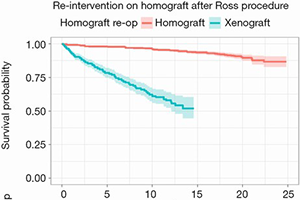Systematic review and meta-analysis of long-term outcomes in adults undergoing the Ross procedure
Abstract
Background: The management of aortic valve disease is becoming increasingly complicated with the evolution of treatment options available to cardiac surgeons and cardiologist. Pulmonary autograft replacement of the aortic valve, commonly known as the Ross procedure, involves excision of the pulmonary valve from the right ventricular outflow tract and implantation in the aortic position. This systematic review aims to evaluate the long-term outcomes, following the Ross procedure.
Methods: An electronic search strategy queried five online medical referencing databases from inception to 21 August 2020. All studies detailing the long-term outcomes of adults undergoing the Ross procedure were included. A random effects model was used to determine pooled continuous data. Enhanced secondary survival analysis was performed on reconstructed individual patient data.
Results: Twenty-three studies were included in the qualitative synthesis, including a total of 6,278 patients with a mean follow-up duration of 6.0±2.8 years. Long-term survival was 95.6%, 91.8%, 86.3% and 80.5% at five, ten, fifteen and twenty years, respectively. Freedom from autograft reoperation was 95.7%, 91.2%, 84.9% and 76.1% at five, ten, fifteen and twenty years, respectively.
Conclusions: When performed in experienced centres and for appropriately selected patients, the Ross procedure represents a durable replacement of the aortic valve with excellent long-term survival.
Cover






